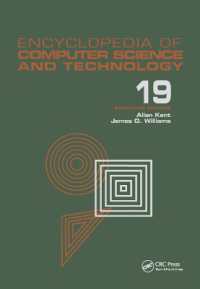- ホーム
- > 洋書
- > 英文書
- > Politics / International Relations
Full Description
The only introduction to critical security studies to take a question-centred approach, with a unique emphasis on equipping students with the knowledge and skills to think, analyse, and debate using critical perspectives. Security Studies: Critical Perspectives introduces the analysis of security from critical and interdisciplinary perspectives. Taking a student-centred approach to understanding contemporary security themes and cases, it provides an accessible set of analytic steps so that students develop the critical thinking skills and confidence to ask important questions about security and our worlds in contemporary politics. Common-sense security assumptions that reproduce forms of oppression and domination are revealed and their justifications decentred while perspectives inclusive of class, gender and sexualities, ethnicity and race, religion, disability, culture and ideology, political belonging, and the global south are introduced. In doing so, the authors combine critical analysis with concrete empirical issues that connect students to the social and political worlds around them.
Five foundation chapters introducing students to key concepts and methodologies
Fifteen thematic chapters, written by leading security analysts exploring key themes in security
Detailed illustrative cases for each thematic chapter
Accessible short introductions, in the online resources, to some of the major theoretical approaches in critical security studies
Online resources
Extensive cross-references to encourage students to link elements, draw connections and identify similar logics, questions, and approaches.
Digital formats and resources
Security Studies: Critical Perspectives is available for students and institutions to purchase in a variety of formats, and is supported by online resources.
USBLThe e-book offers a mobile experience and convenient access along with additional case studies, introductions to theoretical approaches, a bank of useful web links, and questions for further reflection.BEUE
Contents
Approaching security critically
1: Xavier Guillaume and Kyle Grayson: What is critique?
2: Xavier Guillaume and Kyle Grayson: Security
3: Xavier Guillaume and Kyle Grayson: Orders, power and hierarchies
4: Xavier Guillaume and Kyle Grayson: Political violence
5: Xavier Guillaume and Kyle Grayson: Critical Questions
Key Themes in Security Studies
6: Cédric Moreau de Bellaing: Policing
7: Victoria Basham: War and socio-political orders
8: Christian Olsson: Terrorism and asymmetric conflicts
Security as Identity
9: Melody Fonseca Santos: Identity and othering
10: Jennifer Hobbs and Laura McLeod: Gender and sexuality
11: Philippe M. Frowd: Nationalism, racism and xenophobia
Security as Political Economy
12: Maria Stern: Securing development, developing security?
13: Sara E. Davies and Jessica Kirk: Health
14: Caitlin Ryan: Property, extraction and accumulation
Security as Technology
15: Rocco Bellanova: Digital, (in)security and violence
16: Mark Lacy: Security and design
17: Michael Bourne: Weapon-systems
Security as Space
18: Madeleine Fagan: Environment
19: Benjamin J. Muller: Borders and mobility
20: Anna Schliehe: Prisons and Camps








